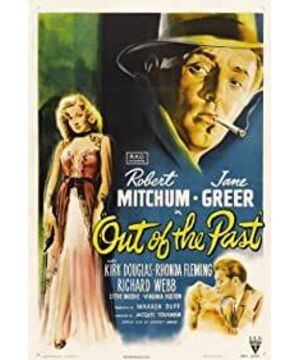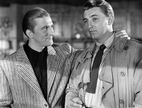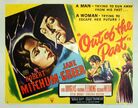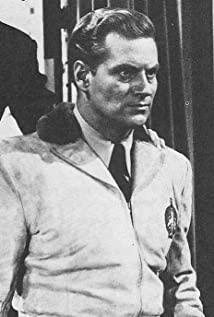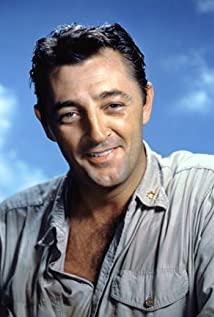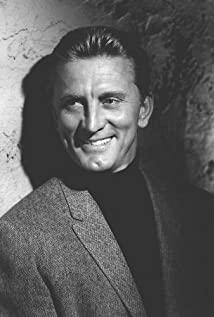"Outside the Vortex" integrates the triple power of romance, conspiracy and reality. The lover in the first half of the elopement is extremely romantic, intoxicating and impulsive; the murder of the second half is simple in structure, but exciting and intricately laid out; and in the end, In the finale, these dramatic plots are once again pulled back to the most fundamental characters' destiny and character themes. The design of a movie can have such a combination of inheritance and transformation, which cannot but be admired. Perhaps this is the best result of the game between the three screenwriters with different styles. Robert Mitchum plays Jeff Bailey, formerly known as Jeff Markham, a private detective in New York. At that time, he was hired by the big boss Witt Stirling (Kirk Douglas, glamorous in appearance) to track down a man named Cathy Moffey (Jane Greer, who exudes irresistible sexy and Cunning) whereabouts of the woman. Cathy fired four shots at Stirling, beat him once, and allegedly passed his 40,000 yuan. Stirling asked him to bring her back. I didn't actually want to retaliate against her. He said, "I just want her to come back to me. You will understand if you have seen her."
According to the law of film noir as we know it, the protagonist must make a choice, he succeeds, and then he must pay the price for this choice. Just like the old boxer in "The Man Who Sells the Flesh" (1949), he won the game, gained dignity, but lost his right hand; another example is Walt Nefer in "Double Compensation" (1944), who murdered his lover Her husband received double compensation, but eventually lost his life as a result. So what was Jeff's choice and what was the price? Jeff’s choice, like most of the leading male protagonists in noir films, was to choose the wrong woman, and the price seems to be exactly the same, that is, to be killed by this woman-Jeff’s role is really quite satisfactory. Mid-lift. Therefore, the most worthy of discussion in this movie may not be him, but Cathy.
Cathy is one of the female protagonists who is very plump, three-dimensional and glamorous in film noir. Similar to a noir film, the heroine in the story may be sexy and charming at first, but she will soon reveal a fox’s tail, showing a snake-hearted heart. Few of them are still sympathetic towards the end, let alone dreaming. Yes, Cathy is different. Cathy was different when she appeared on the stage. She actually shot and murdered the gang boss, and shot four times in a row. This gave the audience a wonderful first impression. She had her own sturdy side. Then, the first appearance at the bar was indeed very convincing. It was truly extraordinary for a woman who could make Jeff, such an unsmiling man, fall in love at first sight. More importantly, during this period until she shot and killed, the relationship between her and Jeff was very convincing. Their love was sincere, passionate, and yearning, which made the audience and Jie The root cause of the husband's confusion and infatuation. Except for that fatal lie-she actually took the money, which greatly reduced the audience's trust in her, and this mistrust was especially intensified when she betrayed Jeff to join Wise. After that, Cathy exhausted all her tactics and capriciousness, which disappointed her step by step until she was completely desperate for this woman. However, what is interesting is that this woman never feared her lies, until the end when she shot Jeff to death, she even said brazenly: Two-faced guy! It seems that the one who is better at betrayal is not himself, but Jeff.
This woman will never turn her face easily with others until she is finally about to commit a murderous attack. What a "smart" way of survival is this! So I must emphasize that this woman is the most not to be ignored among all the heroines of film noir. Successfully portrayed this character, this movie has been more than half successful! The film shows the above plot with flashback. When Jeff made his first appearance, he was hugging his lover Ann (Virginia Houston) by the lakeside of the beautiful Sierra Nevada Mountains. He leaned over to kiss her, but was interrupted by Jimmy (Titch Moore), a deaf-mute worker at the gas station. Jimmy told him in sign language that a stranger was visiting. The person who came was Stirling's right and left hand, Joe Stefano (played by Paul Valentine). He told Jeff that Stirling was waiting for him at the Lake Tahoe Lodge. Jeff drove to Lake Tahoe overnight, taking his real name, his past, how he traced Cathy all the way to Mexico and fell in love with her ("Then I saw her and walked out of the sun's rays, I just Understand why Witte doesn't care about the 40,000 yuan.") All this is clear. More than that: He also confessed how he lied to Stirling, how he eloped to San Francisco with Cathy, thinking that he could start over, but was caught by Jeff's former partner Fischer (played by Steve Brody) Hit it right. Fischer traced them all the way to their remote wooden house. Cathy shot him to death with a single shot, leaving only the corpse and her $40,000 bank passbook, missing.
The narration of the above story took Jack all night, forty minutes of the movie. The clock turned back to reality, and the scene came to Stirling's residence. Ann drove away, and Jeff approached his past. After entering the house, Jeff was not surprised to find that Cathy had returned to Stirling. Stirling really had a peculiar way of thinking that people could understand. Not only did he find Cathy who shot him back, but also hire Jeff who betrayed him. This time he wanted him to deal with Leonard Ils, an accountant in San Francisco, who used Stirling's accounts as a threat to blackmail huge sums of money. Robert Mitchum and Kirk Douglas laughed too coldly at the meeting, so that it was easy to be missed: "Do you smoke?" Kirk Douglas motioned. "It's lit," Robert Mitchum said, raising his "cigarette holder." This inexplicable and off-line clip always made me laugh. After watching "Outside the Whirlpool" at the Virginia Film Festival, I asked Robert Mitchum: "Are you an organized and premeditated smoking cigarette?" I asked him . "No, it's not." "There are more smoking scenes in this film than any other movie." "We didn't think about it, just smoked. And I'm not surprised at all because—to be honest—I don’t remember that I watched it. This movie." "You have never watched it?" "You must have watched it, but it took too long, I don't remember." This is Robert Mitchum, who doesn't care about his work. actor.
"Outside the Whirlpool" can be described as smoky. But all film noirs-even those produced in recent years-have cigarette butts everywhere, because cigarettes and film noirs are the same thing. However, few movies make use of the smoking scene in this way: in Kirk Douglas and Robert Mitchum's "contradictory play" of smoking, it is not an exaggeration to say that they are competing with each other with cigarettes. The director of the film is Jacques Turner, the noir master of Raiden China Film Studio. His famous works include "Leopards" (1942) and "Walk with Zombies" (1943). But the most successful work of his life was "Beyond the Whirlpool" written by James M. Cain. This time is the third collaboration between him and photographer Nicolas Mslaka. Nicolas Mslaka is so familiar with shadows—and light. He injected the blank space between the two into light, making the clouds and fog more Presence. Although Jacques Turner has worked in Hollywood for a long time and made many films, only this "Outside the Whirlpool" can make him remember that he is also a good director. Hollywood’s very famous Nicholas Mslaka and Jacques Turner jointly created the appearance of this film. The austere photographic style and unique lens angle shown in this film give this film a very The amazing visual effects, even if viewed by today's standards, are still impeccable.
Robert Mitchum and Kirk Douglas thought this was a "man's will showdown", and they were both applauded by femme fatale. Cathy betrayed the two more than once, including Mita Carson (Rhonda Fleming), the hot "secretary" of accountant Ils. What is fascinating is that Jeff, played by Robert Mitchum, even if he knows what Cathy has done and what he wants to do, he still goes to the meeting without any regrets-he and Stirling and Cathy "abandon the previous suspicion" meeting together, while Saying "I know someone is calculating me" at the same time he promised Mita to visit Ils, and pointed out that the wine was poured to him to imprint his fingerprints on the glass, and so on. The death of Ils, the whereabouts of the tax bill, and Mita Carson's take-all-in-and-out, a series of plots in San Francisco are dizzying. It is surprising how people in the play can tell who is right and who is wrong. But this is not the point. The point is how Jeff, knowing that there is something wrong with the danger, did not forget about Cathy Mofei, and at the same time believing that he could retreat single-handedly.
He first expressed his fascination with Cathy in Mexico, when Cathy pleaded that he did not take the $40,000. "But I didn't take anything. I didn't, Jeff. Don't you believe me?" "Baby, I don't care." After that, even though he scolded her as a broken ship drifting with the flow, he was still deeply attracted, like every Like a man, he can't stop with dangerous and wrong things. Another hallmark of film noir is tongue twisters like quizzes, and the lines of "Beyond the Whirlpool" is a "completion of short sentences and verses." The script was adapted from the 1946 novel "Three Feet Digging the Grave" by Kifry Holmes, whose pseudonym is Daniel Meihualing, and was supplemented by screenwriter James M. Cain. After reading through all versions of the script for a 1990 film review, film critic Jeff Schwarg wrote to me: "Daniel Meihualing’s script is not excellent, and one of the versions also includes a crappy voiceover for deaf-mute children. . James M. Cain’s screenplay overturned it, but it was even worse and completely abandoned. The wonderful dialogue actually came from the hand of the B film screenwriter Frank Fenton. His most famous work is John Ford’s "Eagle "Wings." Watch Stirling let his subordinate Stefano curb a contemptuous sentence "smoke a cigarette, Joe." "And" say a number, Joe. "Watch Joe tell Jeff how he found his gas station: "The world is small. "Jeff said: "Or the sign is too big. "Kathy said, "I hate him." He should have died long ago. Jeff: "Give him some time. "Jeff's taxi driver brother followed Mita Carson back: "I lost her. Jeff: "It's not a waste of time. Jeff said to Cathy: "Go out, okay?" I have to sleep here. "Kathy to Jeff: "You are not a good person, nor am I." That's how we boarded right. "Finally, Cathy said in the most classic passage of the film: "I don't want to die. "Jeff said: "I don't want to, baby, but if I have to die, I hope I will be the last. "
Director Jacques Turner managed this atmosphere well, and the excellent plot made the film a masterpiece of "film noir". The film also has a notable feature. The shadows of the characters make the characters always appear in the gloom, weird and depressing. The film also points out the weaknesses of men. In front of beauty, they often take risks and fall, while women will inevitably become a tool to use, and ultimately harm themselves. Love is extravagant in such a world, and it is even more regrettable. In order to create an atmosphere, the film always chooses the night, and the shadows of the branches of the trees cast on the faces of the characters, which makes people feel fearful about the future. The ending is destined for film noir, so the dense darkness always makes people despair of the world. At the end of the film, the rivalry between the family girlfriend Ann and the deaf worker Jimmy contains an ambiguous silence, which also reveals the moral ambiguity of the film. I don't want to reveal too much of the plot, but is Jimmy's answer to Ann what he believes, what he thinks she wants to accept, or what he thinks is the best answer for her?
View more about Out of the Past reviews


